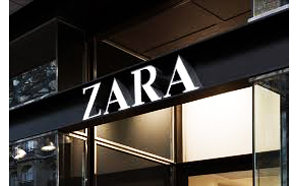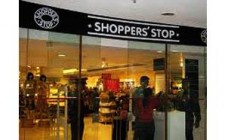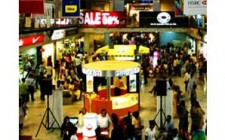Zara's fast fashion finds its shopaholics
By Chaitanya Muppala | Vjmedia Works | January 07, 2014
With frequent refreshes and inclusive pricing, the fashion brand has been one of the fastest to clock profits.
 Disha Maru, a 47-year-old resident of south
Mumbai, says she is hooked on to Zara: She shops at the Spanish fast fastion brand's store
at a luxury mall in Lower Parel at least once a month. "I also shop at
Mango, Vero Moda but I prefer Zara for its styles and pricing," Maru says.
The store had been abuzz with shoppers such as Maru ahead of the brand's day of
discounted sale on January 2. On the day of the sale, there were serpentine
queues of customers at the billing counters.
Disha Maru, a 47-year-old resident of south
Mumbai, says she is hooked on to Zara: She shops at the Spanish fast fastion brand's store
at a luxury mall in Lower Parel at least once a month. "I also shop at
Mango, Vero Moda but I prefer Zara for its styles and pricing," Maru says.
The store had been abuzz with shoppers such as Maru ahead of the brand's day of
discounted sale on January 2. On the day of the sale, there were serpentine
queues of customers at the billing counters.
Devanshu Dutta, chief executive of retail consultant Third Eyesight, says that
even before Zara launched its first store in 2010 in India, the web traffic for
online purchase from India was one of its highest in the world. "It is
highly possible that Zara shoppers buy once in five-six weeks, if not once in
two weeks as they do in western markets. Most of the other brands would be lucky
if they got the same shopper once in two months," Dutta adds.
Real estate industry sources say Zara follows a revenue-sharing model with
malls rather than fixed rent. "We have seen developers bending backwards
to accommodate the brand. It acts as a status symbol and crowd-puller for
them," says a top realty consultant who did not wish to be quoted.
Inditex, the brand's parent, did not respond to an email.
High on profits
Zara has not only been a draw among consumers but has managed to become
profitable in a short time. Incorporated in 2009-10, Inditex Trent Retail India, the operational entity running
Zara in India and the joint venture between Inditex and Tata-run Trent, has
made profits in the second year of operations and has been profitable since
then. For the financial year 2013, Inditex Trent made net profits of Rs 45.19
crore on sales of Rs 411.19 crore. The Italian brand Benetton, on the other
hand, which has been in India for close to a decade, posted a much smaller net
profit of Rs 4.73 crore on higher sales of Rs 521.27 crore in 2012-13.
"I do not think there is any brand which has been this successful as
quickly besides Zara. Levis, Benetton could be some of the biggest brands but
they took long time to get there," Dutt says.
Zara has 13 stores in Mumbai, Delhi and Bangalore, including those in Phoenix
Mills malls in Pune, Chennai and Bangalore besides Mumbai. Globally, it has
1,808 stores in 86 countries.
More per square
In terms of per square-foot (sq-ft) sales, Zara is clocking the highest in the
industry,say retail industry sources. While leading departmental stores
such as Shoppers Stop or Pantaloons record sales per sq-ft of around Rs
8,000-9,000, Zara, with stores measuring 15,000 to 20,000 sq-ft, has sales of
Rs 50,000 per sq-ft.
Says Rajendra Kalkar, senior centre director, west region, for Phoenix Mills, a
Mumbai developer: "Zara is a trendy brand and retails collections of
affordable clothes. It should create a flutter in the country." At
the company's Palladium mall,where 2 million customers walk in every month,
Zara alone draws in a crowd of over 100,000. Experts say that the brand's
choice of locations has played a key role in ensuring footfalls convert to
sales.
Churn is good
The biggest draw for Zara's clientele is its frequent refreshing of
merchandise. Zara is believed to bring in a fresh collection once every
fortnight in India, relegating older products to sale-time - either at
marked-down prices or for end-of-season. In Europe, it updates its merchandise
twice a week. In comparison, most fashion brands, both international and national, follow a
season-based approach to bringing in new merchandise.
"The options Zara brings is higher than other brands, with many kinds of
fits," says Prashant Agarwal, cofounder and joint managing director of
Wazir Advisors, retail consultant.
Zara has also tweaked its pricing. An affordable high-street brand worldwide,
it has had a premium positioning in India. But today, it retails products in
lower, mid and premium categories in womenswear, rather than just mid to
premium as it did a couple of years ago.
Its prices are at least 20 per cent lower than its main competition Mango and
Vero Moda in some categories, say consultants.
Direct competiton awaits
But Zara will have to work to maintain its dream run, now that many international brands are set to enter India. Says Kalkar of Phoenix Mills, "Today it does not have direct competition. When Gap and H&M enter India, there will be real competition." Some say the business model will be in trouble if customers do not change their wardrobe frequently, owing to the slowdown that has also spurred preference for discounted merchandise. "Zara's business model is built on the premise that customers will look for newness," reminds Third Eyesight's Dutta. Dutta adds when customers look for the best deal, it does not matter whether the products are fresh or not.








